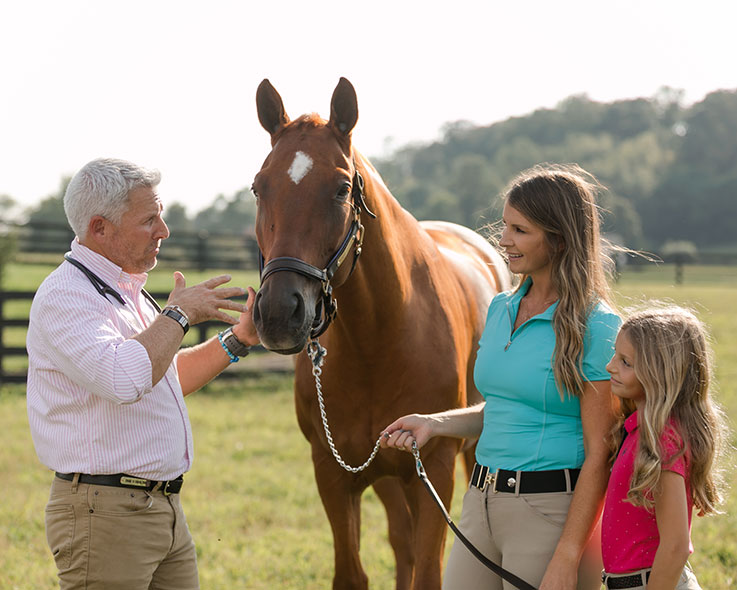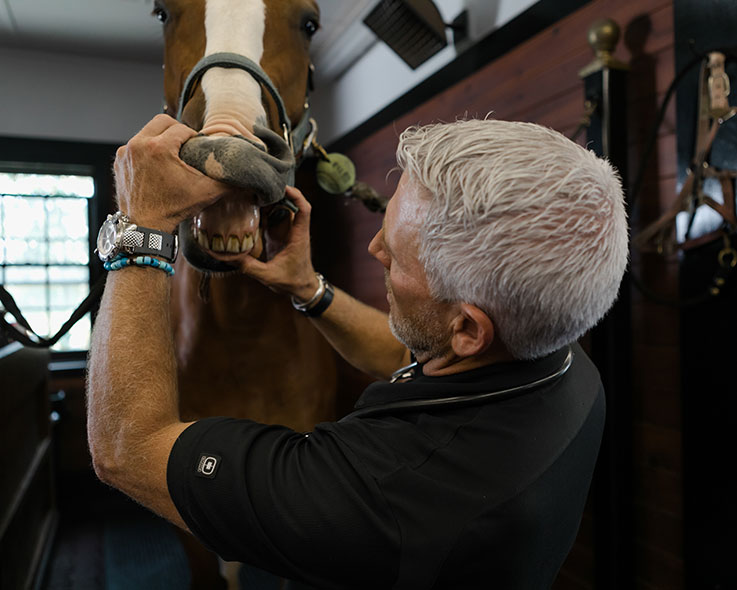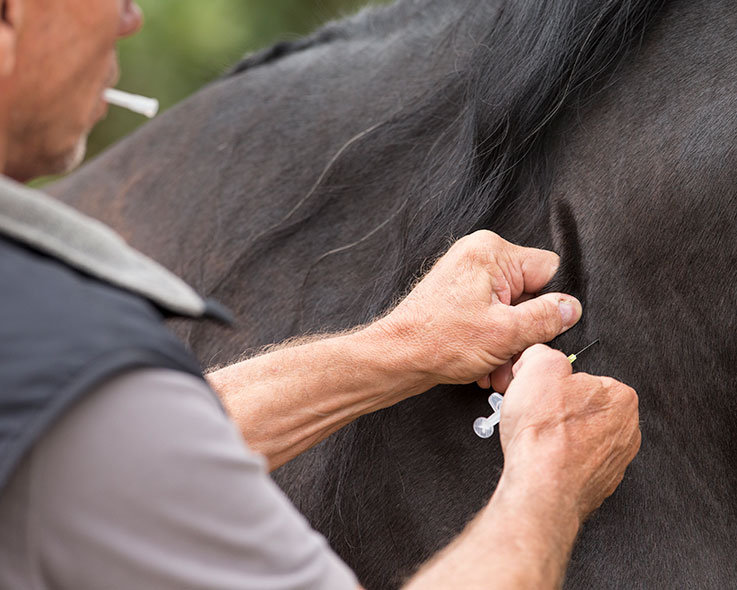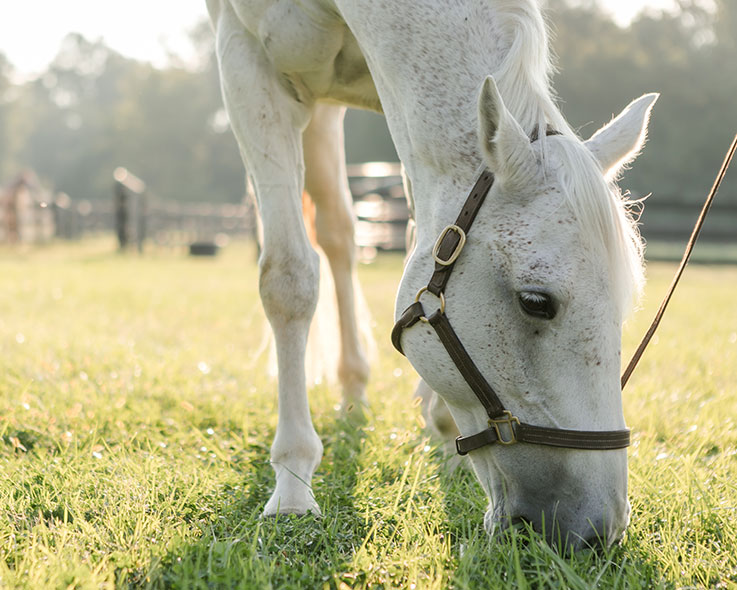Welcome to Platinum Colic Coverage®, the program that combines routine wellness services with the right nutrition for a healthier horse and your peace of mind. In the event your horse needs colic surgery, you can rest easy while this complimentary program helps reimburse you for the cost of surgery up to $15,000.
Next Steps
To maintain Platinum Colic Coverage®, follow these simple steps with your enrolled horse:
Feed Platinum Daily
Ensure your horse is getting the recommended dosage of Platinum Performance® formulas every day.
Stay Consistent
Keep your Platinum Performance® formulas on auto-ship to guarantee consistency. Your auto-ship can't be delayed more than 14 days at any time or more than 28 days within a 12-month period.
Visit Your Veterinarian
Your horse will need an annual wellness exam, including a dental exam, fecal egg count test, vaccination program and 1 deworming per year.
HELPFUL HINT: When will my horse’s coverage begin?
Your horse’s coverage will begin 56 calendar days from the shipment date of your first order after enrollment unless your coverage start date was otherwise determined by a Platinum Advisor.
Veterinary Service Requirements
It is important to keep up with the veterinary service requirements in order to remain eligible for Platinum Colic Coverage®. Here is a breakdown on each of the requirements:
1. Annual Wellness Exam

At least one physical wellness examination by your licensed veterinarian is required each year. If your veterinarian makes any recommendations for your horse’s health during this exam or otherwise, it is important to follow these recommendations to stay eligible for colic surgery reimbursement.
Benefits
The annual wellness exam gives you an opportunity to discuss your horse’s overall health and performance with your veterinarian. This preventive approach can help to identify any potential issues before they become a major concern and stay up-to-date with your horse’s individual needs.
FAQ
When do I need to get my horse’s wellness exam?
To stay eligible for Platinum Colic Coverage®, you need documentation of one wellness exam for every 12 month period. If your horse has not had one in the last 12 months, you need to schedule one now. Keep track of your horse’s wellness records so they can easily be provided in the event that you need to file a claim for colic surgery reimbursement.
2. Annual Dental Exam

Your enrolled horse needs to have at least one dental examination by your licensed veterinarian each year. If your horse has not had a dental exam in the last 12 months, then you need to schedule one now.
Benefits
The first step to ensuring your horse maintains healthy digestion is to make sure his teeth are healthy and functioning properly. When horses are not able to consume food normally because of poor dentition, their eating habits and digestive health can be drastically affected.
Benefits of routine equine dental care:
- Improves proper mastication and general chewing of food.
- Supports feed efficiency.
- Helps maintain body condition and ideal weight.
- Allows your vet to identify any abnormalities in the teeth or mouth.
- Can provide pain relief associated with dental issues promoting comfort, longevity, performance and overall health.
FAQ
How often should I have my horse’s teeth checked?
A horse’s age and dental history should be taken into consideration when knowing when to get a horse’s teeth checked. Here are some suggested guidelines created by the AAEP (American Association of Equine Practitioners):
- Juvenile Horses — When foaled, at three months old and then every six months until the age of five.
- Healthy Adult Horses — Should be checked once a year.
- Senior Horses older than 20 or with a history of dental problems — Two times per year.
3. Equine Vaccination Program

You will need documentation of your horse’s annual vaccinations administered by your licensed veterinarian for the “core” vaccinations along with any additional vaccinations recommended by your vet.
Benefits
The goal of a vaccination program is to develop and maintain immunity against infectious diseases and protect the long-term health of horses. Your veterinarian may choose to design a program specific to you and your horse’s needs, taking into consideration a variety of factors including the likelihood of exposure to infectious agents, the risk for your horse to develop adverse reactions, the history of disease in your area and the age of your horse.
FAQ
What are the “core” vaccinations?
The American Association of Equine Practitioners (AAEP) defines the “core” vaccinations as the following:
- Eastern/Western/Venezuelan Equine Encephalomyelitis
- Rabies
- Tetanus
- West Nile Virus
It is important to remember to always follow your veterinarian’s recommendations when giving these vaccinations and any other vaccines that your vet recommends.
4. Deworming Program

Make sure you maintain a veterinary-directed deworming program that includes a fecal egg count and one deworming per year.
Benefits
Infection caused by intestinal worms is one of the most common equine diseases that affects horses everywhere, no matter what environment they live in. Since these parasites take up post in the digestive tract, they affect digestive health with common symptoms including weight loss, diarrhea, lack of appetite, and in severe cases, even colic. If we don’t take care of these uninvited guests then they will overturn our entire wellness and nutrition program.
FAQ
What is a Fecal Egg Count?
Defined as the number of parasite eggs per gram (epg) in a horse’s manure sample before deworming, the fecal egg count can help you and your veterinarian design a worming program specific for your horse.
Key Requirements to Remember
Correct Daily Dosage:
Make sure your horse is receiving the full recommended dosage of Platinum Performance® formulas on a daily basis.
Auto-Shipments:
Do not increase the number of days between your automatic shipments nor delay your automatic shipment more than 14 days per shipment or over a total of 28 days in a 12-month period.
Coverage Begins:
Your horse’s coverage will begin 56 calendar days from the shipment date of your first order after enrollment.
Traveling Abroad:
Make sure to let Platinum Performance® know ahead of time if the enrolled horse travels abroad.
Contact Us:
If your horse requires colic surgery, notify Platinum Performance® within 14 days following surgery.
Reimbursement Forms:
Submit all completed reimbursement forms and proof of veterinary services to Platinum Performance® within 21 days of the colic surgery

